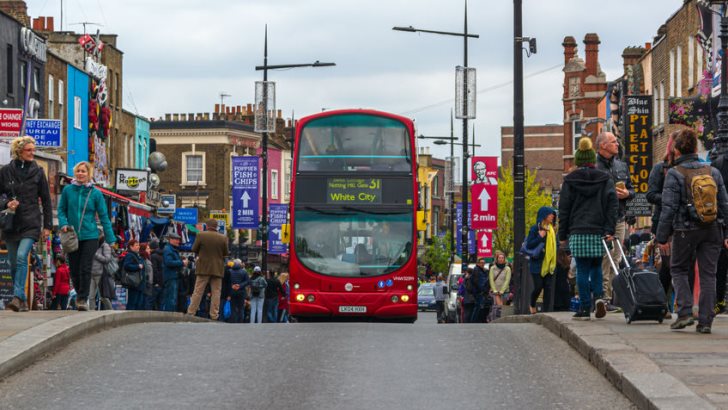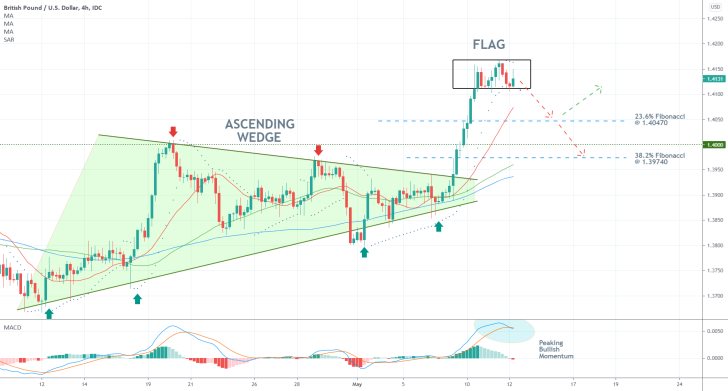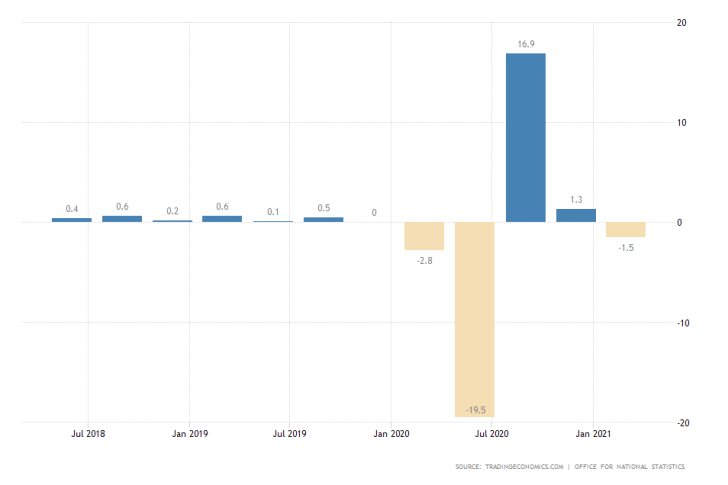
The GBPUSD remained relatively unfazed by the preliminary GDP growth rate numbers that were published by the Office for National Statistics in the UK. Even though the reported performance was slightly better than the projections of the initial forecasts, the British economy still shrunk by 1.5 per cent in Q1.
The market was bracing for a marginally bigger slump of 1.6 per cent in the three months leading to March, despite improving economic conditions that were recorded over the same period.

The GBPUSD continues to consolidate above the psychologically significant resistance-turned-support level at 1.40000, as bullish commitment in the market peaks. This is confirmed by the MACD indicator.
The breakout above this major threshold occurred after the price action penetrated above the Ascending Wedge pattern, as can be seen on the 4H chart above. At present, the pair appears to be consolidating within the boundaries of a narrow range (Flag).
Given that the pound was not strengthened by the better-than-expected GDP data for Q1, the GBPUSD may finally be due for a minor bearish correction. That is, if the price action does not break out above the Flag and continue advancing further north.
The two Fibonacci retracement levels - the 23.6 per cent at 1.40470 and the 38.2% at 1.39740 - seem like two potential targets for such a correction. Notice that the two are positioned around the psychological support at 1.40000, which increases the likelihood of adverse fluctuations between the two Fibonacci retracements.
Meanwhile, the 20-day MA (in red) represents the first obstacle for bears, as the GBPUSD would have to break it before it can head any lower.
Restrictions continue to weigh down on growth
Even though headline recovery continues to be going at a pace that exceeds the initial forecasts, something that became even more apparent by the more hawkish outlook of the BOE, reintroduced restrictions in the U.K. continue to stymie growth.

The economic contraction in Q1 was mostly owing to the reintroduction of more stringent restrictions in Britain, as coronavirus cases shot up in February and March. This impeded the process of reopening the economy, which consequently reduced the underlying activity.
Trendsharks Premium
Gold is undergoing a correction, as investors take profits to offset losses from falling stock prices, impacting their margins. However, we anticipate a renewed wave of [...]
The Swiss stock market index is mirroring its global counterparts, such as Germany 40 and US100, experiencing a sharp decline following the announcement of new [...]
We’re analyzing the weekly chart to grasp the broader market trend. Over the past three years, the US30 index has surged by 17,000 points, often resembling a nearly straight [...]
Over the past week, the DAX has experienced a sharp decline, plunging by an astonishing 3,400 points. This downward movement is not isolated, as its international counterparts, such as the UK100 and US100, are also facing significant [...]
EURUSD recently formed a double top at 1.0930, signaling a potential trend reversal, and has since begun a correction. After a 600-pip rally since early March, a pullback at this stage is both expected and healthy. Given these conditions, we are placing a [...]
Since early March, EURJPY has surged nearly 1,000 pips, providing us with several excellent trading opportunities. However, as the rally matures, many early buyers are beginning to take profits, leading to a noticeable slowdown in the uptrend. On Friday, the pair formed a [...]
The AUDJPY currency pair continues to be dominated by bullish momentum, as multiple golden cross patterns reaffirm the strength of the ongoing uptrend. Despite this, we are witnessing a much-needed [...]
The EURAUD currency pair appears to be undergoing a trend reversal, signaling a potential shift in market direction. A notable technical development is the formation of a Death Cross on the chart, a widely recognized bearish indicator that typically suggests a [...]
After securing an impressive 200-pip profit last week, the EURJPY currency pair is now undergoing a southward correction, retracing some of its recent gains. Despite this temporary pullback, the Golden Cross remains intact, reinforcing our view that the overall trend continues to be [...]
The appearance of a Golden Cross in Silver strengthens our analysis that the metal is currently in a strong uptrend, indicating further bullish momentum in the market. This technical pattern, where the short-term moving average crosses above the [...]
This trade presents a considerable level of risk and can be classified as an opportunistic move based on recent price action. The GBPUSD currency pair has experienced a substantial bullish rally, surging by nearly 500 pips in a strong upward movement. However, after this extended period of appreciation, the pair is showing signs of a potential [...]
The anticipated Death Cross on the SMI20 appears to be failing as price finds strong support at the 23% Fibonacci retracement level. After testing this area, the index has shown bullish strength, printing several large green candles, signaling an increase in [...]
A Golden Cross has just appeared on the USDJPY chart, signaling a potential bullish move. This technical pattern occurs when the 20 period moving average crosses above the 60 period moving average, a widely recognized indication of increasing [...]
After 2 months of a down trend, we finally see some indications of price recovery for Oil. The golden cross, a historic buy signal, supports this [...]
For the past month, the German DAX40 has experienced a remarkable 10% surge, reflecting strong bullish momentum. Despite ongoing market volatility and frequent pullbacks, every dip continues to attract fresh buyers, reinforcing the [...]
Oil continues its downward trajectory, despite occasional pullbacks. The overall trend remains bearish, reinforced by multiple Death Cross patterns, a classic sell signal indicating further weakness. Adding to this bearish outlook, the critical [...]
Over the past few days, gold has experienced a sharp decline of more than $100. This downturn can be attributed in part to traders securing profits to manage their margins, which are under strain due to the significant drop in major indices. Currently, gold has fallen below the [...]
The NASDAQ 100 index is showing strong bullish momentum, as evidenced by the formation of a Golden Cross on the chart. This classic buy signal occurs when the short moving average crosses above the long term moving average, suggesting that upward momentum is [...]
The EURAUD currency pair has encountered a significant resistance level, failing to break above the critical 61% Fibonacci retracement level. This suggests that bullish momentum is weakening, reinforcing the case for a potential downward move. Given this technical setup, we favor entering a [...]
The UK100 is experiencing a remarkable rally! Over the past few weeks, the British stock market index has surged nearly 800 points. Each minor dip has attracted more buyers, fueling the bullish momentum. However, since last week, we’ve observed a slight [...]




















